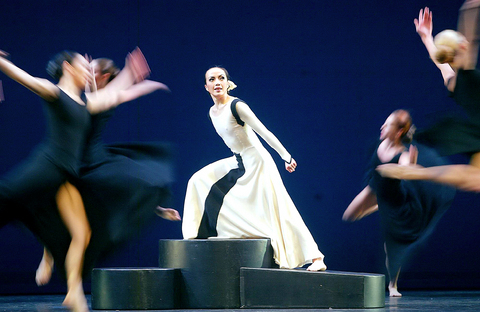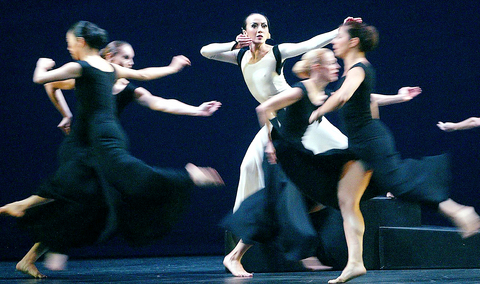Inspiring, intense and serious are three words that are often used to describe Sheu Fang-yi (
Sheu joined the Martha Graham Dance Company in 1995, one year after she graduated from Taipei National University of the Arts with a bachelors of fine arts in dance and went to New York on a full scholarship to study at the Martha Graham School of Contemporary Dance.
She became a soloist with the company in 1997 and was promoted to principal dancer just two years later.

In person, Sheu's slight frame belies the power she displays on stage. She is also unassuming, stressing that despite all the attention centered on her during the Graham company's visit to the National Theater this weekend, that this trip is about the company, not about her.
"Being a star is not my job; dancing is my job," she said in an interview on Thursday.
"I have a lot of opportunities to have my picture in magazines but that's not my goal."

PHOTO: WANG YI-SUNG, TAIPEI TIMESN
Sheu is also not so sure that her dancing should be considered the epitome of the Graham Technique.
"I didn't train at the Graham school," she said. "What the real Graham technique is, is something maybe only Martha Graham knows.
"It's like sex. A climax is only something that you can feel," she said, laughing before adding, "But it's something that can be faked -- the pull and release [of the Graham Technique]."
"I studied [Graham Technique] with Ross Parkes [a former Graham principal dancer. He has been a teacher at the Taipei National University of the Arts for many years] and his way of teaching is a little different -- how to use your muscles. How a teacher presents himself, presents the class -- it's always going to be different," she said.
"But one of the teachers at the Graham school saw me one day and said to the others `if you want to learn the real Graham Technique go to Taiwan," she said.
However, she added, "I'm not sure my dancing is so orthodox."
Whether or not her technique is pure Graham, most people who have seen her dance agree that she has brought a new dynamic to her roles.
"I have to get closer to the ground, dig deeper," she said, talking about how she prepares for a role.
"You have to practice. I know how to pace myself, how to take care of my body. When I know I can do it, then I'll try to do it full out," she said.
That willingness to go full out, even in rehearsals, was something that other dancers in the company commented on during a press conference on Thursday.
"This woman means business, on or off stage. In rehearsals or in performance, she inspires and gives you the extra energy to go to places that you need to go to," Slovenian dancer Tadej Brdnik said. "She's scary, she's loving ... when it's required."
Oklahoma-born Heidi Stoeckley also talked about how Sheu inspires everyone to go to a higher level.
"I had not been in the company too long and they kept mentioning that she was coming to rehearsals. One day she came ... she was dancing the red woman. I didn't know who she was but I was glued to her for the entire run-through. She didn't dance like anyone else. She's just a complete joy to watch," Stoeckley said. "Afterwards, I went up to her and told her I was so impressed and she just said `Let's go have a coffee.'"
"She has kept that integrity," Stoeckley said. "We all want to be like that."
"She's really fun to work with ... she can laugh and work very hard, be very fierce and serious at the same time," said Jennifer de Palo-Rivera, soloist with the company.
Fierceness is a quality needed for many of the roles that Graham created, craziness would seem to be another. But Sheu said it is all about control.
"The crazier the role, the more calm you should be," Sheu said, using the role of Medea (in Cave of the Heart) as an example. "You can control your emotions, control the audience's emotions, so you can take them with you. You can't just go crazy, go wild."
Control is also crucial if you are trying to balance life as a dancer in New York and on the road with commitments here in Taiwan.
Sheu's family is here and she has maintained her ties with the Taiwanese dance scene. She danced as a soloist with the Cloud Gate Dance Theater in 1998, 2000 and 2001 and then as a guest artist with Cloud Gate 2 last spring. In 2002 she formed the LA/FA Dance Theater with choreographer Bulareyaung Pagarlava, another Cloud Gate alumnus who is also her boyfriend.
But a life split between a career in New York and family and friends in Taiwan has not been easy.
"We live in the same neighborhood in New York. So we often take the same [subway] train home after work," said fellow dancer, French-born Virginie Mecene. "One day I asked her what she was going to do on the weekend and she said she was just going to stay home and sleep ... there wasn't anything else. She misses her family and home in Taiwan so much that she can't make her home in New York."
Sheu admitted as much when asked how she felt about coming back to Taiwan with the company.
"It's one of my dreams -- that my dancing and my life can be in the same place," she said. "Maybe only for a few days my dream can come true."
When asked what she saw herself doing in the future, she said that what she wanted was to to pass on her skills. But she also said there are more roles in the Graham repertoire that she wanted to try, including Night Journey and Clytemnestra.
"I'm not ready to stop learning yet," she said.

Jan. 26 to Feb. 1 Nearly 90 years after it was last recorded, the Basay language was taught in a classroom for the first time in September last year. Over the following three months, students learned its sounds along with the customs and folktales of the Ketagalan people, who once spoke it across northern Taiwan. Although each Ketagalan settlement had its own language, Basay functioned as a common trade language. By the late 19th century, it had largely fallen out of daily use as speakers shifted to Hoklo (commonly known as Taiwanese), surviving only in fragments remembered by the elderly. In

William Liu (劉家君) moved to Kaohsiung from Nantou to live with his boyfriend Reg Hong (洪嘉佑). “In Nantou, people do not support gay rights at all and never even talk about it. Living here made me optimistic and made me realize how much I can express myself,” Liu tells the Taipei Times. Hong and his friend Cony Hsieh (謝昀希) are both active in several LGBT groups and organizations in Kaohsiung. They were among the people behind the city’s 16th Pride event in November last year, which gathered over 35,000 people. Along with others, they clearly see Kaohsiung as the nexus of LGBT rights.

Dissident artist Ai Weiwei’s (艾未未) famous return to the People’s Republic of China (PRC) has been overshadowed by the astonishing news of the latest arrests of senior military figures for “corruption,” but it is an interesting piece of news in its own right, though more for what Ai does not understand than for what he does. Ai simply lacks the reflective understanding that the loneliness and isolation he imagines are “European” are simply the joys of life as an expat. That goes both ways: “I love Taiwan!” say many still wet-behind-the-ears expats here, not realizing what they love is being an

In the American west, “it is said, water flows upwards towards money,” wrote Marc Reisner in one of the most compelling books on public policy ever written, Cadillac Desert. As Americans failed to overcome the West’s water scarcity with hard work and private capital, the Federal government came to the rescue. As Reisner describes: “the American West quietly became the first and most durable example of the modern welfare state.” In Taiwan, the money toward which water flows upwards is the high tech industry, particularly the chip powerhouse Taiwan Semiconductor Manufacturing Co (TSMC, 台積電). Typically articles on TSMC’s water demand